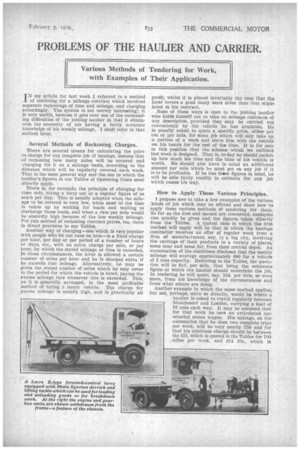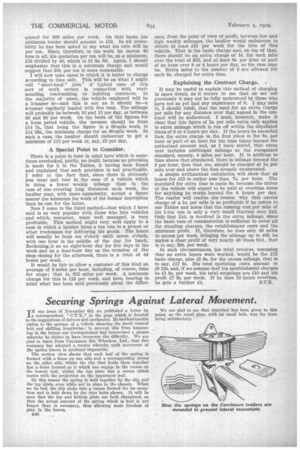PROBLEMS OF THE HAULIER AND CARRIER.
Page 31

Page 32

If you've noticed an error in this article please click here to report it so we can fix it.
Various Methods of Tendering for Work, with Examples of Their Application.
IN my article for last week I referred to a method of tendering for a mileage contract which involved separate reckonings of time and mileage, and charging accordingly. The system is not merely interesting; it is very useful, because it gets over one of the outstanding difficulties of the jobbing haulier in that it eliminates the necessity of his having a fairly accurate knowledge of his weekly mileage. I shall refer to that method later.
Several Methods of Reckoning Charges.
There are several means for calculating the price to charge for any complete job of haulage, besides that of reckoning how many miles will be covered and charging for it on a mileage basis, according to the distance which will be regularly covered each week. That is the most general way and the one to which the haulier's figures in our Tables of Operating Costs most directly apply.
There is, for example, the principle of charging for time only, hiring a lorry out at a regular figure of so much per day. This is usually adopted when the mileage to be covered is very low, when most of the time is taken up by waiting for loads and waiting to discharge those loads, and when a rate per mite would he absurdly high because of the low weekly mileage. For this method of reckoning contract prices, too, there is direct provision in our Tables.
Another way of charging—one which is very popular with people who let out vans on hire—is a fixed charge per hour, per day or per period of a number of hours or days, etc., with an extra charge per mile, or per hour, by which the stated mileage or time is exceeded. in these circumstances, the hirer is allowed a certain number of miles per hour and he is charged extra if he exceeds that mileage. Alternatively, he may be given the stated number of miles which he may cover in the. period for which the vehicle is hired, paying the excess mileage rate whenever this is exceeded. This, as it is generally arranged, is the most profitable method of hiring a motor vehicle. The charge for excess mileage is usually high, and is practically all profit, whilst it is almost invariably the case that the hirer covers a good many more miles than that stipulated in his contract.
None of these ways is open to the jobbing haulier who holds himself out to take on mileage contracts of any description, provided they may be carried out cenveniently by the vehicle he has available. He is usually asked to quote a specific price, either per ton or per mile, for some job which will only take up :a portion of a week and leave him with the vehicle em his hands for the rest of the time. It is for men in this position that the scheme which we outlined last week is designed. That is, to-day he should reckon up how much his time and the time of his vehicle is worth. He should also have in mind an additional amount per mile which he must get on any job if it is to be profitable. If he has these figures in mind, lie will be able fairly readily to estimate for any job which comes his way.
How to Apply These Various Principles.
I prOpose now to take a few examples of the various kinds of job which may be offered and show how to apply these various methods Of tendering for them. So far as the first and second are concerned, examples an quickly be given and the figures taken directly from the Tables. A typical case in which the first method will apply will be that in which the haulage contractor receives an offer of regular work from a firm of manufacturers, say, ta a big city, involving the carriage of their products to a variety of places,' some near and some far, from their central depot. An examination of the conditions discloses that the weekly mileage will average approximately 600 for a vehicte of 2 ,tons capacity. Referring to the Tables, the quotation will be 8id. per mile, that being the minimum figure at which the haulier should undertake the job. In tendering he will quote, say, 10d. per mile, or even more, from his knowledge of the circumstances and from what others are doing.
Another example in which the same method applies, but not, perhaps, quite so directly, would be where a haulier is asked to travel regularly between Manchester and London, carrying a load of 10 tons each way. It may be assumed that for that work he uses an articulated sixwheeled steam wagon. His mileage, on the assumption that he does two complete trips per week, will be very nearly 750 and for that his minimum charge should be between the £51, which is quoted in the Tables for 700 miles per week, and £54 10s., which is
quoted for 800 miles per week. On that basis, his minimum tender should amount to 153. In all probability he has been asked to say what his rate will be per ton. Since, therefore, in the week he moves 40 tons in all, his quotation per ton will be, as a minimum, £53 divided by 40, which is £1 Os. 6d. Again, I should emphasize that this is a minimum charge and would suggest that 30s. per ton is more reasonable.
I will now take cases in which it is better to charge according to time only. This will be on what I might call " short-haul " jobs." A` typical case of this sort of work occurs in connection with roadmending, road-making or building contracts. In the majority of cases, the vehicle employed will be a 5-tonner or—and this is not as it should be—a 4-tonner regularly loaded with five tons. The mileage will probably be betweell 10 and 15 per day, or between 60 and 80 'per week. On the basis of the figures for a 5-ton petrol vehicle, the revenue should be from £14 75., that being the figure in a 60-mile week, to £14 18s., the minimum charge for an 80-mile week. In such a case, the haulier should endeavour to get a minimum of £15 per week or, say, £3 per day.
A Special Point to Consider.
There is a point to bear in mind here which is sometimes overlooked, partly, no doubt, because no provision is made for it in the Tables, it having been found and explained that such provision is not practicable. I refer to the fact that, since there is obviously less wear and tear in the case of a vehicle which Is doing a lower weekly mileage than in the case of one covering long distances each week, the haulier may, with more equanimity, accept a figure nearer the minimum for work of the former description than he can for the latter.
Now I come to the third method--that which I have said is so very popular with those who hire vehicles and which, moreover, when well managed, is very profitable. This method might very well apply to a case in which a haulier hires a ton van to a grocer or other tradesman for delivering his goods. The hours will usually be from ten o'clock until seven o'clock, with one hour in the middle of the day for lunch. Reckoning,it as an eight-hour day for five days in the week and as a four-hour day on the occasion of the shop closing for the afternoon, there is a total of 44 hours per week.
It would be fair to allow a customer of this kind an average of 8 miles per hour, including, of course, time for stops; that is, 352 miles per week. A minimum charge for this is £13 per week, and here, bearing in mind what has been said previously about the differ
enee, from the point of view of profit, between low and high weekly mileages, the haulier would endeavour to obtain at least £15 per week for the hire of this vehicle. That is the basic charge and, on top of that, there should be an extra charge of is. for each mile over the total of 352, and at least 8s, per hour or part of an hour over 8 or 4 hours per day, as the case may be. Extra miles to the number of 8 are allowed for each 8s, charged for extra time.
Explaining the Contract Charge.
It may be useful to explain this method of charging in more detail, as it occurs to me that as set out previously it may not be fully understood by those who have not as yet had any experience of it. I may take I should think; that the need for an extra charge per mile for any distance over that named in the contract will be understood. I must, however, make it clear that this figure of is. per mile extra only applies to extra mileage which is run off within the stipulated times of 8 or 4 hours per day. If the hours be exceeded then the extra charge in the first place is the 8s. per hour or part of an hour for the time taken beyond the authorized amount and, as I have stated, that extra rate includes additional mileage at the recognized standard, namely, 8 Miles per hour. If, in addition to time above that stipulated, there is mileage beyond the 8 per hour, then that, too, should be charged at Is. per mile over and above the fees already enumerated.
A simple arithmetical calculation will show that 44 hours for £15 is rather less than 7s. per hour. The standard for extra time is made 8s. because the driver of the vehicle will expect to be paid at overtime rates for anything he works beyond the 8 hours per day. The reader will realize one reason why this excess charge of a is. per mile is so profitable if he refers to our Tables and notes that the running cost per mile of his 1-ton van is only a very small fraction over 2iel. Only that 21d. is involved in the extra mileage, since the basic Tate of remuneration is sufficient to cover all the standing charges, the establishment costs and the minimum profit. If, therefore, he does only 48 miles in excess per week, bringing the mileage up to 400, he makes a clear profit of very nearly 48 times 9id., that is to say, 385. per week.
In such circumstances, his total revenue, assuming that no extra hours were worked, would be the £15 basic charge, plus £2 8s. for the excess mileage, that is to say, 117 8s. His total operating costs amount to £8 12s. and, if we assume that his establishment charges be £1 8s. per week, his total outgoings are £10 and his profit £7 8s. per week. If he does 10 hours overtime,
he gets a further £4. S.T.R.


































